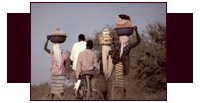|
Module 4: Gender and Rural Transport Initiative (GRTI)
4.2. GRTI Main Findings
Gaps Identified by GRTI Studies
The GRTI studies identified the need for:
- Gender-sensitive transport policies
- Going beyond micro projects to infrastructure
- Promotion of non-transport solutions to transport problems
- Improved transport related services (such as credit, repairs)
- Testing of suitability of other types of IMTs
- Improved and sex-disaggregated M&E indicators
- Training in research methodology
GRTI Findings
|
Constraints
|
Opportunities
|
-
Women and female children bear most of the transport burden in rural areas.
-
A large proportion of the transport-related activities of females are
carried out in and around their rural communities.
-
Walking and head-loading are the predominant means of transportation
used by rural women to carry out most of their activities.
-
Cultural or religious norms have restricted rural women's access to
improved means of transportation, including various types of IMTs.
-
Due to their transport constraints, much of rural women's time is
spent in accomplishing routine tasks, leaving them little time for
income-generating activities or leisure.
-
A strong relationship exists between transport constraints and
inability to break out of the poverty cycle.
-
Transport policy has been largely "gender neutral" and has not
taken into account the different transport needs of males and females.
|
-
GRTI has helped bring gender to the forefront in defining national transport policy.
-
Introduction of socially acceptable IMTs and group action of women to secure their own IMTs are effective ways to enhance rural women's transport conditions and reduce their burden.
- Women are effective managers of transport or
other infrastructure facilities when given the opportunity
and an enabling environment.
- Facilitating improved, gender-relevant transport
strategies require understanding and addressing
a large and diverse set of stakeholders.
-
Gender awareness-raising from policy makers to the grassroots level is needed to improve transport conditions for rural women.
-
Workshop outputs need to be translated into action.
|
|
|
Taking Advantage of Good Rural Transport and Travel Practices
-
Carrying out pre-intervention studies (Cameroon)
-
Recognizing locality-specific differences (Burkina Faso, Ethiopia, Nigeria and Tanzania).
-
Locally produced and maintained IMTs (Ghana, Malawi, Guinea, Cote d' Ivoire).
-
Gender disaggregated research findings (Nigeria).
-
Workshops promoting gender sensitivity in transport (Madagascar, Malawi, Kenya, Tanzania and Zimbabwe).
-
Differentiating long-term from short-term project objectives and activities (Nigeria and Zambia).
|
